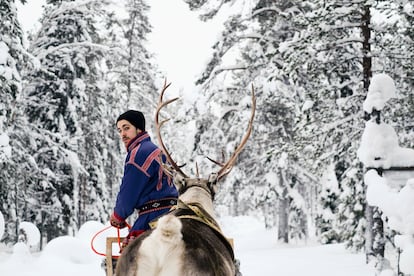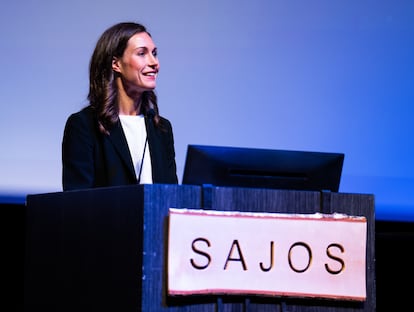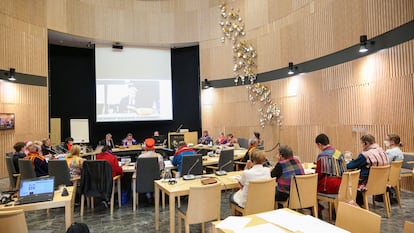With the triumph of the right, Finland’s Sámi people face bleak future
After conservative and far-right parties won the 2023 Finnish elections, the original inhabitants of the land fear that they have now lost hope for more self-governance, at a time when the climate emergency threatens their livelihoods


Residents of Utsjoki — the northernmost municipality in the European Union, in the northeast of Finland — yearn for the taste of salmon. The fish that was an essential food in this remote town for centuries has now become a luxury.
For the past four years, the fishing of salmon has been banned in Teno River, the country’s natural border with Norway. This traumatic ban has overshadowed the future of the municipality, which is the only place in the Nordic country where the Sámi — the last indigenous people in Europe — are the majority.
The scarcity of salmon around Utsjoki — a direct consequence of the drastic increase in temperatures — is a clear example of how climate change has jeopardized the livelihoods and pillars of an ancient culture. This critical situation only adds to the deep disappointment faced by Finland’s Sámi community — made up of just 10,000 people — which has long hoped for the right to greater self-governance. With the triumph of conservative and far-right parties in April’s federal elections, the future for the indigenous Finns appears bleak.
“Salmon is a cornerstone of our culture,” says Aslak Holmberg, a schoolteacher in Utsjoki, in a phone interview with EL PAÍS. The veto on fishing has damaged the local economy, with thousands of fishing enthusiasts no longer making the trip up to stay in the town’s motels. Holmberg, 34, accepts the need to impose quotas, but demands “a cultural right” over the river. He believes that, should salmon fishing be allowed again, the Sámi should have priority.
Last year, the indigenous community of Finland was filled with hope at the prospect of obtaining greater decision-making power over the natural resources of the north of the country — a policy that was promoted by the government led by the Social Democrat Sanna Marin, who is still acting prime minister. However, that illusion vanished after the conservatives and extreme rightists triumphed in the parliamentary elections six weeks ago.
In total, some 80,000 Sámi live between Norway, Sweden, Finland and Russia. Some now reside in large cities, far from the northernmost lands of Europe where fishing, hunting and reindeer kept their ancestors alive for thousands of years. But many still fight to ensure that their ancient culture and traditions can coexist with the modern world. “We’re running out of time to transmit the necessary knowledge to the youngest ones… traditional net fishing requires lots of learning and experience,” Holmberg laments.
The indigenous people of Finland are represented by the Sámediggi — the Sámi Parliament — a constitutionally recognized consultative body. In order for someone to be able to vote or be a candidate in the Sámi elections, they must meet only one of three requirements: two are based on proof of a single ancestor’s ability in the Sámi language, while one is related to the fulfillment of tax payments on fishing and hunting claims, which can go back several centuries. This verification system has been contentious due to how broad it is, clouding the very definition of Sámi identity.
For decades, prominent members of the indigenous community of Finland — supported by historians, jurists and various international organizations — have been demanding a reform of the Sámi Parliament Law, which regulates the active and passive suffrage of the assembly, in addition to its functions. “If [the law] isn’t modified, there will come a time when the Finns take control [of the chamber],” Leo Aikio emphasizes. He is vice president of Sámediggi, located in the town of Inari. With the support of various rulings from the Supreme Administrative Court of Finland, citizens residing in Lapland (Finland’s northernmost region) have been spuriously declaring to be Sámi. They have managed to gain access to the consultative body, with the intention of curbing the aspirations of true indigenous people.

“The Supreme Administrative Court has interpreted the law arbitrarily,” says Laura Junka-Aikio, a professor of Political Science at the University of Lapland. “The judges have admitted dubious evidence for the preparation of the electoral census,” she adds. Different UN committees — such as the Human Rights Committee, or the Committee on the Rights of the Child — have criticized various rulings made by the high court, as they deprive the Sámi of the right to self-determination.
The Sámi of Finland were excited when Marin became prime minister of the Nordic country in 2019. The social democratic policy promised to eliminate the tax payment criteria and give the Sámediggi greater decision-making power over the use of natural resources. Although this was still far from the capacity to veto related legislation passed at the national level, which has long been the indigenous community’s goal.
Marin’s attempts to carry out the reform were rejected by one of her coalition partners: the Center Party of Finland, which has an agrarian electoral base that is opposed to granting more territorial rights to the Sámi. Ultimately, opposition within Marin’s own Social Democratic Party prevented the reform from reaching a vote.
As political infighting buried hopes of legal reform, extraordinarily high temperatures exacerbated the climate emergency in a region that is warming at least four times faster than the planet’s average. Some 45 miles southeast of Utsjoki is one of the most unpopulated areas in the entire EU: Sevettijärvi. There, the inhabitants can still fish for salmon; it’s no longer as abundant, but it still fills the freezers. And, every month, about 20 indigenous people meet at the local school with Tero Mustonen, a prestigious researcher and activist who travels hundreds of miles to meet them. During their sessions, they discuss the next steps they will take in their inexhaustible effort to conserve and restore the local ecosystem.

Sevettijärvi is not just another town in the vast Finnish taiga. It was built at the end of the 1940s to resettle 50 families that had been evacuated from Finnish territory annexed by the Soviet Union during World War II. They were all Skolt — a branch of the Sámi, with less than 1,000 members. The tribe preserves one of the most endangered dialects in Europe: this has made Sevettijärvi its cultural capital.
Snowchange — the NGO run by Mustonen — cooperates with the area’s residents to stop and reverse the degradation of their forests, rivers and lakes, where they keep their ancestral knowledge and traditions alive. Efforts in recent decades to revitalize Skolt have slightly increased the number of speakers, although Mustonen considers that “the path to survival is very steep.”
“Sámi culture and traditions depend on continuous connections with language and nature,” the activist sums up. Mustonen was recently one of the winners of the Goldman Environmental Prize, awarded in Washington, D.C. at the end of April. It is considered to be a sort of Nobel Prize in ecology.
The Sámi languages have more than a hundred words referring to different types of snow, but there is no adequate word to describe the kind that, for the past few years, has fallen sporadically, covering pastures and wreaking havoc among the herds of reindeer. This wet snow — mixed with heavy rainfall — has caused thick layers of ice to cover the ground, making it impenetrable for the deer, whose hooves can’t break through. They die by the thousands, as they are unable to dig for the vegetation that they eat. The drastic effects of climate change have further clouded the future of reindeer herding — an ancient activity that, for decades, has already suffered the serious consequences of logging.
Marin’s reform would not have guaranteed the survival of the Skolt, nor ended the rains in February. But it would have allowed the Sámi community to define its own identity and would have given it greater decision-making power over projects that affect the areas in which they reside, as well as the use of natural resources that they depend on, such as the Teno River. The probable agreement that is being negotiated between the newly-elected conservatives and the extreme right curtails any possibility that the Samédiggi Law will be modified in the near future.
During the months in which the reform took up the media spotlight, the debate turned very bitter. It even gave way to a cultural battle between the Sámi and their allies and part of rural Finland, opposed to what they consider to be unjustified privileges. These citizens were supported by the most reactionary elements of the right, as well as the logging industry. Several prominent members of the Sámi community received death threats. Junka-Aikio thinks that, despite the fact that “some populists have been able to generate some anti-Sámi sentiment, for the first time, the debate has not been monopolized by those who are directly opposed to indigenous rights.”
In addition to trying to reform the Sámi Parliament Act, Marin promoted the creation of the Truth and Reconciliation Commission — a body intended to shed light on the systematic abuses suffered by this community. However, the first steps of the Commission have been a resounding failure: it has been plagued by several resignations, a lack of funds and an inability to generate legitimacy among the citizenry.
The reconciliation process — which has been implemented in Canada or Scandinavia — is complex for Finnish society, whose collective memory is very much tied to the years of Swedish and Russian occupation, but not so much to its colonizing period in the northern lands. The Sámi writer Helga West believes that now is not the time to stir up the past, at least until the “state is able to solve the problem that it itself generated [with the Sámi Parliament Act].” On her blog, she expressed that “if Marin’s government couldn’t comply with the reform, I don’t think that the political climate is ideal to seek reconciliation with the Sámi.”
Sign up for our weekly newsletter to get more English-language news coverage from EL PAÍS USA Edition
Tu suscripción se está usando en otro dispositivo
¿Quieres añadir otro usuario a tu suscripción?
Si continúas leyendo en este dispositivo, no se podrá leer en el otro.
FlechaTu suscripción se está usando en otro dispositivo y solo puedes acceder a EL PAÍS desde un dispositivo a la vez.
Si quieres compartir tu cuenta, cambia tu suscripción a la modalidad Premium, así podrás añadir otro usuario. Cada uno accederá con su propia cuenta de email, lo que os permitirá personalizar vuestra experiencia en EL PAÍS.
¿Tienes una suscripción de empresa? Accede aquí para contratar más cuentas.
En el caso de no saber quién está usando tu cuenta, te recomendamos cambiar tu contraseña aquí.
Si decides continuar compartiendo tu cuenta, este mensaje se mostrará en tu dispositivo y en el de la otra persona que está usando tu cuenta de forma indefinida, afectando a tu experiencia de lectura. Puedes consultar aquí los términos y condiciones de la suscripción digital.








































